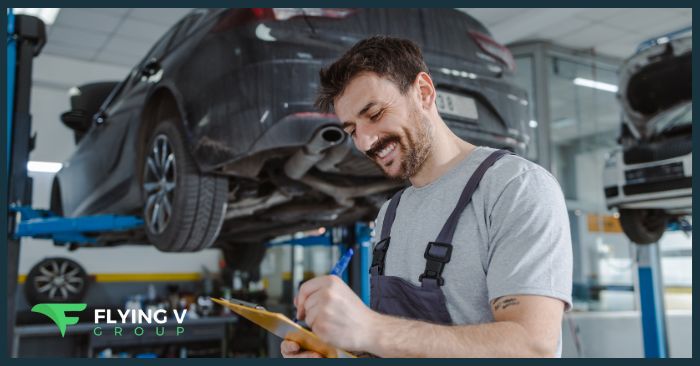Digital marketing for automotive businesses is crucial if you want to enhance visibility, engage more effectively with customers, and accelerate your sales growth. As more consumers turn to the internet to research and purchase vehicles, it’s essential for you to harness powerful digital marketing strategies to maintain a competitive edge.
In this article, we will delve into the best digital marketing techniques to boost your online presence, attract more customers, and drive sales. From SEO and PPC to social media and content marketing, we’ll show you how to use these tools to dramatically improve your digital strategy and put your automotive business miles ahead of the competition. Buckle up and get ready to turbocharge your marketing success!
- Digital Marketing for Automotive Business Starts With Understanding Your Audience
- Key Digital Marketing Strategies
- Enhancing Customer Interaction
- Measuring and Analyzing Performance
- Transform Your Automotive Marketing with Flying V Group
- FAQs
- What is digital marketing for automotive businesses?
- How can SEO benefit an automotive dealership?
- What are effective PPC strategies for automotive marketing?
- Why is content marketing important for the automotive industry?
- How can social media marketing enhance customer engagement for automotive brands?
Digital Marketing for Automotive Business Starts With Understanding Your Audience
A successful digital marketing strategy begins with a deep understanding of your audience. In the automotive industry, this involves identifying and segmenting target audiences to tailor your marketing efforts effectively.
Identifying and Segmenting Target Audiences: To effectively reach your audience, use tools and techniques for audience analysis and segmentation. Leverage data from various sources, including:
- Demographics: Age, gender, income, and location.
- Behavior: Online browsing habits, purchasing history, and engagement with automotive content.
Tools for Audience Analysis:
- Google Analytics: Track user behavior and segment audiences based on their actions on your website.
- Social Media Insights: Utilize platforms like Facebook and Instagram to gain demographic and behavioral insights.
Creating Buyer Personas: Developing detailed buyer personas helps in crafting personalized marketing messages. Here are examples specific to the automotive industry:
- Tech-Savvy Millennial: Aged 25-35, urban dweller, prefers eco-friendly vehicles, extensively researches online before making a purchase.
- Family-Focused Parent: Aged 35-45, suburban resident, prioritizes safety features and spacious interiors, looks for deals and financing options.
- Luxury Car Enthusiast: Aged 40-55, high-income bracket, values brand prestige and high-performance vehicles, influenced by reviews and exclusive offers.

By understanding and segmenting your audience, you can create targeted and effective digital marketing campaigns that resonate with potential car buyers, enhancing engagement and driving sales.
Key Digital Marketing Strategies
Effective digital marketing for the automotive industry requires a multifaceted approach. Here, we explore key strategies to enhance your online presence and drive business growth.
Search Engine Optimization (SEO)
SEO is vital for improving your website’s visibility in search engine results, attracting organic traffic, and generating leads.
On-page SEO:
- Keywords: Use relevant keywords in titles, headers, meta descriptions, and throughout your content. For example, “best family SUVs” or “affordable electric cars.”
- Content Quality: Ensure your content is high-quality, informative, and regularly updated.
- User Experience (UX): Optimize your website’s loading speed, mobile-friendliness, and navigation.
Off-page SEO:
- Backlinks: Build high-quality backlinks from reputable automotive sites and blogs.
- Social Signals: Engage on social media to increase your website’s visibility and drive traffic.
Technical SEO:
- Site Structure: Ensure your site has a clear structure with proper URL formatting.
- Security: Implement HTTPS to secure your website.
- Crawlability: Use an XML sitemap and robots.txt to help search engines crawl your site efficiently.
Local SEO:
- Google My Business: Optimize your listing with accurate business information, photos, and customer reviews.
- Local Keywords: Use keywords that include your location, such as “car dealership in Los Angeles.”
- Local Citations: Ensure your business is listed accurately across local directories.
Pay-Per-Click (PPC) Advertising
PPC advertising provides immediate visibility and drives targeted traffic to your website.
Benefits:
- Immediate Results: Quickly appear at the top of search results and drive traffic.
- Targeted Reach: Tailor ads to specific demographics and user behaviors.
Tips for Effective PPC:
- Google Ads: Use targeted keywords, compelling ad copy, and extensions like call buttons.
- Social Media Ads: Leverage platforms like Facebook and Instagram with visually appealing ads and precise targeting options.
Content Marketing
Creating high-quality, informative content positions your brand as an authority and engages your audience.
Types of Content:
- Blogs: Write about car buying tips, maintenance advice, and industry news.
- Videos: Create engaging videos showcasing vehicle features, test drives, and customer testimonials.
- Infographics: Use infographics to present data and information visually.
Leveraging Testimonials:
- Customer Reviews: Feature positive reviews on your website and social media.
- Case Studies: Share success stories of customers’ experiences with your vehicles.
Social Media Marketing
Social media is essential for building brand awareness and engaging with your audience.
Best Practices:
- Consistency: Post regularly and maintain a consistent brand voice.
- Engaging Content: Share a mix of content types, including images, videos, and articles.
- Paid Advertising: Use paid social media ads to reach a broader audience and target specific demographics.
Email Marketing
Email marketing helps nurture leads and maintain customer relationships.
Strategies:
- List Building: Collect email addresses through website sign-ups, promotions, and events.
- Personalization: Use customer data to personalize email content.
- Automation: Set up automated email sequences for new subscribers, abandoned carts, and follow-ups.
Video Marketing
Video content is highly effective for showcasing vehicles and engaging customers.
Tips for Creating Engaging Videos:
- Showcase Features: Highlight unique features and benefits of different models.
- Customer Stories: Share testimonials and stories from satisfied customers.
- Test Drives: Provide virtual test drives to give viewers a feel for the vehicle.
Influencer and Affiliate Marketing
Collaborating with influencers and affiliates can expand your reach and credibility.
Influencer Collaborations:
- Identify Influencers: Partner with influencers who align with your brand and have a strong following.
- Campaigns: Create engaging campaigns that highlight your vehicles and brand values.
Measuring Impact:
- Analytics: Track metrics such as engagement, reach, and conversions to measure the success of influencer campaigns.

By implementing these key digital marketing strategies, automotive businesses can effectively reach their target audience, enhance engagement, and drive sales.
Enhancing Customer Interaction
Enhancing customer interaction in the competitive automotive industry is crucial for building loyalty and driving sales.
Personalization and Customer Experience: Using data to personalize customer interactions can significantly improve satisfaction and engagement. You can tailor messages, offers, and experiences to individual preferences and behaviors by leveraging customer data. Implementing chatbots and AI enhances customer service by providing instant responses, handling inquiries 24/7, and offering personalized recommendations based on customer history and preferences.
Mobile Optimization: Ensuring your website is mobile-friendly is vital, as many customers use their smartphones to research and purchase vehicles. A mobile-first design prioritizes mobile usability, ensuring quick load times, easy navigation, and responsive design. This approach improves the user experience and boosts SEO rankings, as search engines favor mobile-optimized sites. By focusing on mobile optimization, you can reach a broader audience and provide a seamless browsing experience that engages potential customers.
Measuring and Analyzing Performance
Effective digital marketing requires continuous measurement and analysis to ensure strategies are driving desired results. Here’s how to track and adjust your automotive marketing efforts.
Key Performance Indicators (KPIs): Monitoring essential KPIs is crucial for evaluating the success of your marketing campaigns. Important KPIs for automotive digital marketing include:
- Website Traffic: Track the number of visitors to your site.
- Conversion Rate: Measure the percentage of visitors who take a desired action, such as filling out a contact form or purchasing a vehicle.
- Bounce Rate: Monitor the percentage of visitors who leave your site after viewing only one page.
- Customer Acquisition Cost (CAC): Calculate the cost of acquiring a new customer.
- Return on Investment (ROI): Evaluate the profitability of your marketing campaigns.

Tools for Tracking and Analyzing Performance:
- Google Analytics: Provides detailed insights into website traffic, user behavior, and conversion tracking.
- CRM Systems: Track customer interactions, manage leads, and analyze sales data.
- Social Media Analytics: Monitor engagement, reach, and demographics on platforms like Facebook, Instagram, and Twitter.
Adjusting Strategies Based on Data: Use data insights to refine your marketing strategies. For example, if analytics show high bounce rates on certain pages, consider improving content relevance or user experience. If conversion rates are low, test different calls-to-action or landing page designs.
By continuously measuring and analyzing performance, automotive businesses can optimize their digital marketing strategies to achieve better results and drive growth.
Transform Your Automotive Marketing with Flying V Group
Are you ready to revolutionize your digital marketing for automotive success? Flying V Group has the expertise and tools to elevate your brand’s online presence and drive exceptional results.
Flying V Group is a full-service digital marketing agency specializing in creating tailored strategies that include SEO, PPC, content marketing, social media, and more. We understand the unique challenges of the automotive industry and offer innovative solutions to enhance customer interactions, boost engagement, and increase sales. Trust Flying V Group to deliver data-driven insights and cutting-edge technologies to transform your marketing efforts. Partner with us and accelerate your journey to digital success today!
FAQs
What is digital marketing for automotive businesses?
Digital marketing for automotive businesses involves using online strategies to promote car dealerships, manufacturers, and related services. It includes SEO, PPC advertising, content marketing, social media engagement, and email marketing to attract and convert potential car buyers.
How can SEO benefit an automotive dealership?
SEO improves a dealership’s online visibility by optimizing its website for search engines. This helps the dealership rank higher in search results, driving more organic traffic and potential leads. Local SEO is especially beneficial for attracting customers in specific geographic areas.
What are effective PPC strategies for automotive marketing?
Effective PPC strategies for automotive marketing include targeting specific keywords related to car buying, creating compelling ad copy, using ad extensions like call buttons, and running ads on platforms like Google Ads and Facebook to reach a broader audience.
Why is content marketing important for the automotive industry?
Content marketing helps automotive businesses establish authority and engage their audience by providing valuable information. This can include blog posts, videos, infographics, and customer testimonials. Quality content can drive traffic, build trust, and influence purchasing decisions.
How can social media marketing enhance customer engagement for automotive brands?
Social media marketing allows automotive brands to connect with their audience on platforms like Facebook, Instagram, and Twitter. By sharing engaging content, responding to comments, and leveraging paid advertising, brands can build relationships, increase brand awareness, and drive sales.







0 Comments